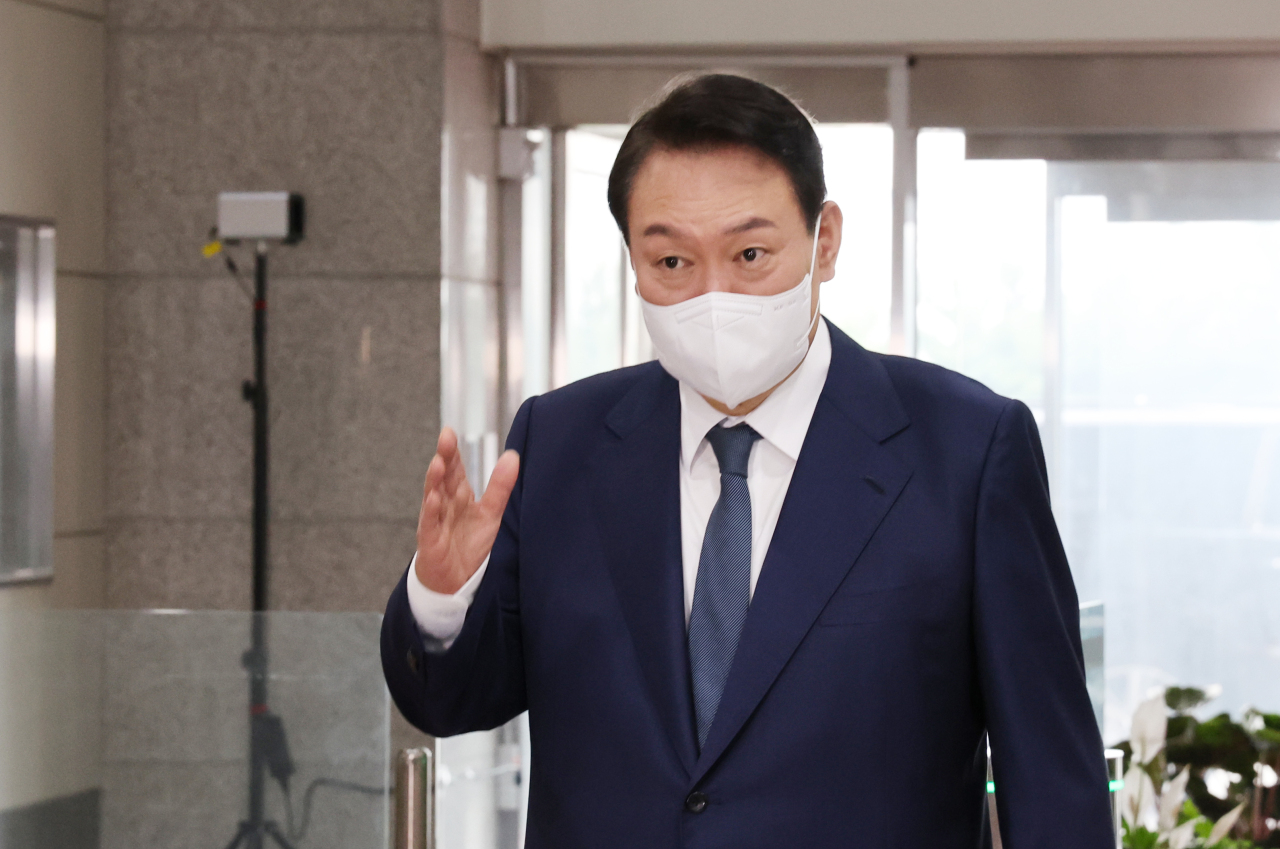President Yoon Suk-yeol was unusually silent at a regular morning briefing on Monday, an apparent move to shift his communication style with the media amid a continuing drop in approval ratings and lingering controversies.
Monday morning’s briefing at the Yongsan presidential office drew a bigger crowd than usual, with reporters ready to grill Yoon about ongoing controversies over personnel appointments and the repatriation of two North Korean fishers.
But Yoon seemed somewhat different standing in front of the press scrum. When asked about the controversial repatriation of the two North Korean fishermen, Yoon answered curtly that he would deal with it “according to principle” without further comments.
Yoon also chose not to respond to a question over scandals linked to his personnel choices and instead asked: “Do you have another question?” Reporters were left bewildered for several seconds, after which Yoon left.
Yoon, who usually takes about four or five questions at such briefings, has been suffering declining approval ratings. The move is seen as the presidential office’s attempt to change tack and keep ratings afloat.
Although Yoon’s efforts to communicate with the media were considered refreshing, the occasional gaffe and loss of composure also spurred controversy, which made headlines and shadowed his administration’s policies.
While Yoon remained silent on Monday morning, his secretaries -- who usually keep to the background -- came to the forefront over the weekend.
On Sunday, Choi Young-bum, senior presidential secretary for press affairs, gave his first briefing --about the repatriation of the North Korean fishers. On the same day, Kang Seung-kyoo, senior presidential secretary for civil society, who also had kept a low profile, explained the recent controversy related to a personnel scandal on his Facebook account.
A poll released Monday showed that Yoon’s approval ratings dropped further.
According to a survey conducted by poll agency Realmeter from July 11-15, President Yoon’s approval rating fell to the low 30 percent range, and the negative perception of state affairs exceeded 60 percent. Those polled who gave Yoon’s performance a positive assessment fell 3.6 percentage points, and those who gave a negative evaluation rose 6.3 percentage points compared to the previous week.
Yoon’s declining approval rating is affected by multiple factors, but one of the main reasons seems to be Yoon’s “unfair” hiring of his acquaintances and his responses to the controversy.
Yoon and the presidential office have refused to apologize whenever such related controversies have erupted, even denouncing the media, critics and the public for taking issue with it.
Most recently, a junior official surnamed Woo in the presidential office was found to be the son of President Yoon Suk-yeol’s acquaintance. It was also revealed that Woo had donated 10 million won ($7,598) to Yoon when he was a presidential candidate.
While the presidential office denied any wrongdoing, the controversy grew further as Kwon Seong-dong, the interim chair and floor leader of the People Power Party, said he put Woo in office. Kwon is the closest aide to Yoon.
Kwon met with reporters on Friday and said he has known Woo since Woo was a child. He said he pressured Chang Je-won -- another close aide to Yoon -- to make Woo a seventh-level official, but he ended up being a ninth-level official, the lowest rank in the civil service. Kwon added that he feels sorry for Woo.
Kwon’s remark and attempt to brush aside criticism of installing Woo in the role prompted swift outrage from young Koreans suffering from unemployment. Many young Koreans consider working at the presidential office a great opportunity.
On Monday morning, a few days after Kwon’s remarks, Chang Je-won said on Facebook that “(Kwon’s) words were very rough” and called for restraint. A few hours later, Kwon said he accepted Chang’s advice.
Critics said Yoon and key officials should work on a change in mindset.
“This controversy over personnel appointments goes against the fairness and common sense that Yoon Suk-yeol advocated during his campaign rally,” said Yu Yong-wha, an invited professor at the Hankuk University of Foreign Studies.
“From the perspective of Yoon and Kwon, ninth-grade civil servants at the presidential office are really nothing. But it is not for many Young Koreans,” the political commentator said. “Yoon and his key officials should be more conscious of how the issue of inequality works and affects young people.”
By Shin Ji-hye (
shinjh@heraldcorp.com)








